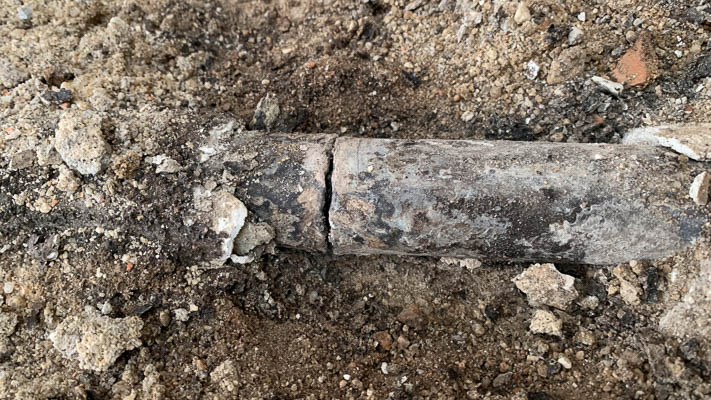Why Was Lead Used For Pipes?
Lead pipes were once a standard in plumbing systems due to their unique properties. The metal is highly malleable, meaning it could be easily shaped into pipes that fit complex or irregular spaces. This flexibility made lead particularly useful for older buildings with tricky layouts.
- Flexibility: Lead is soft and can be shaped to fit complex or tight spaces, making it ideal for irregular plumbing systems in older buildings.
- Corrosion resistance: Lead pipes were highly resistant to corrosion, offering a long lifespan in water systems.
- Durability: Because lead was less prone to deteriorating quickly, it proved to be a long-lasting and relatively low-maintenance material for plumbing.
While these qualities made lead pipes a popular choice for water transport, the negative health effects of lead exposure have since made them a dangerous option. Today, we know that lead can leach into water, posing significant health risks, especially to young children and pregnant women.
What's the Best Type of Lead Test Kit for Plumbing?
If you suspect lead in your home's plumbing, testing your water is the first step. You can check for lead pipes in your home by using a simple scratch test, among other methods (lead usually has a dull gray color).
Lead can leach into water over time from several sources, as we saw in the Michigan Flint Water Crisis. Here are some of the most effective ways to test for lead in your home's freshwater:
- Instant Lead Test Kits: These easy-to-use kits are readily available at local hardware stores as well as online. The kits include test strips that change color when lead is detected. They provide quick results, but they may not be as accurate as laboratory testing. This is a good option for initial screening.
- Lab-based DIY Test Kits: A more accurate test involves taking a sample yourself, then sending it to a lab for testing. This method is more time-consuming, but it's the most accurate. You can also find these kits at most hardware stores.
- EPA-certified laboratory testing: For the most accurate results, contact an EPA-accredited lab. They offer professional water testing with detailed reports, ensuring precise measurements of lead and other potential hazards.
While most lead pipes have been eliminated from plumbing systems, lead service lines connecting a property to the public water main still play a key role in plumbing infrastructure. These lines carry water from the municipal water source to individual homes or buildings, which can result in lead leaching into drinking water as it enters the home.
How to Remove Lead From Your Plumbing
If lead is found in your home's plumbing system, the only long-term solution is to replace them with non-lead pipes.
Homeowners can also install point-of-use water filtration systems to further reduce lead levels at specific water sources, such as kitchen faucets. Filters designed to remove lead, such as activated carbon or reverse osmosis systems, are widely available. It's important to regularly replace the filters to maintain their effectiveness.
While some homeowners may attempt to rely on filtration systems to remove lead contamination, this approach only addresses the issue at a surface level. It's essential to remove the source of the contamination—lead pipes—to ensure your drinking water remains safe.
A whole-home repipe is the most effective way to eliminate lead pipes from your plumbing system. Replacing old lead pipes with modern, safer materials like copper or PEX (cross-linked polyethylene) can provide a long-lasting solution to water contamination.
If you have any further questions, please feel free to contact us to schedule a free consultation with one of our local repipe consultants.
Get your free estimate today
With over 75,000 repipes completed, we've perfected our One-Stop Repipe™ for your home.
Get a Quote for Your Home Repipe
Here at Repipe Specialists, we've fully replaced the plumbing in over 75,000 homes since 1991 using both copper piping and PEX tubing. We continually get positive customer feedback from customers about their overall home repipe experiences. We often exceed their expectations on:
- Speed: Our repipe crews typically complete a repipe in a day, returning on another day for wall patching.
- Convenience: Through our One-Stop Repipe™ Process, we handle everything from permits, to wall patching, to inspections.
- Cleanliness: Our crews are trained to protect your home while working (we cover all surfaces with protective sheeting), and to clean up fully at the end of each day.
- Peace of Mind: Repipe Specialists is a fully licensed plumber in every state we operate in, and we back all of our repipes with a lifetime warranty.
- Financing programs: To help take the sting out of unplanned repipe expenses, we offer several financing programs.
- Price: As a specialist that performs hundreds of repipes a week, we can deliver high-quality repipes at a lower cost vs generalist plumbers. We have an article that covers repipe cost factors in detail. Our quotes typically range from $4,500 to $15,000 depending on the size and complexity of your project.
Schedule a free in-home consult, and one of our local repipe consultants will explain all your repipe options and provide you with a written, fixed-price quote. Use non-lead pipes, repipe now.

